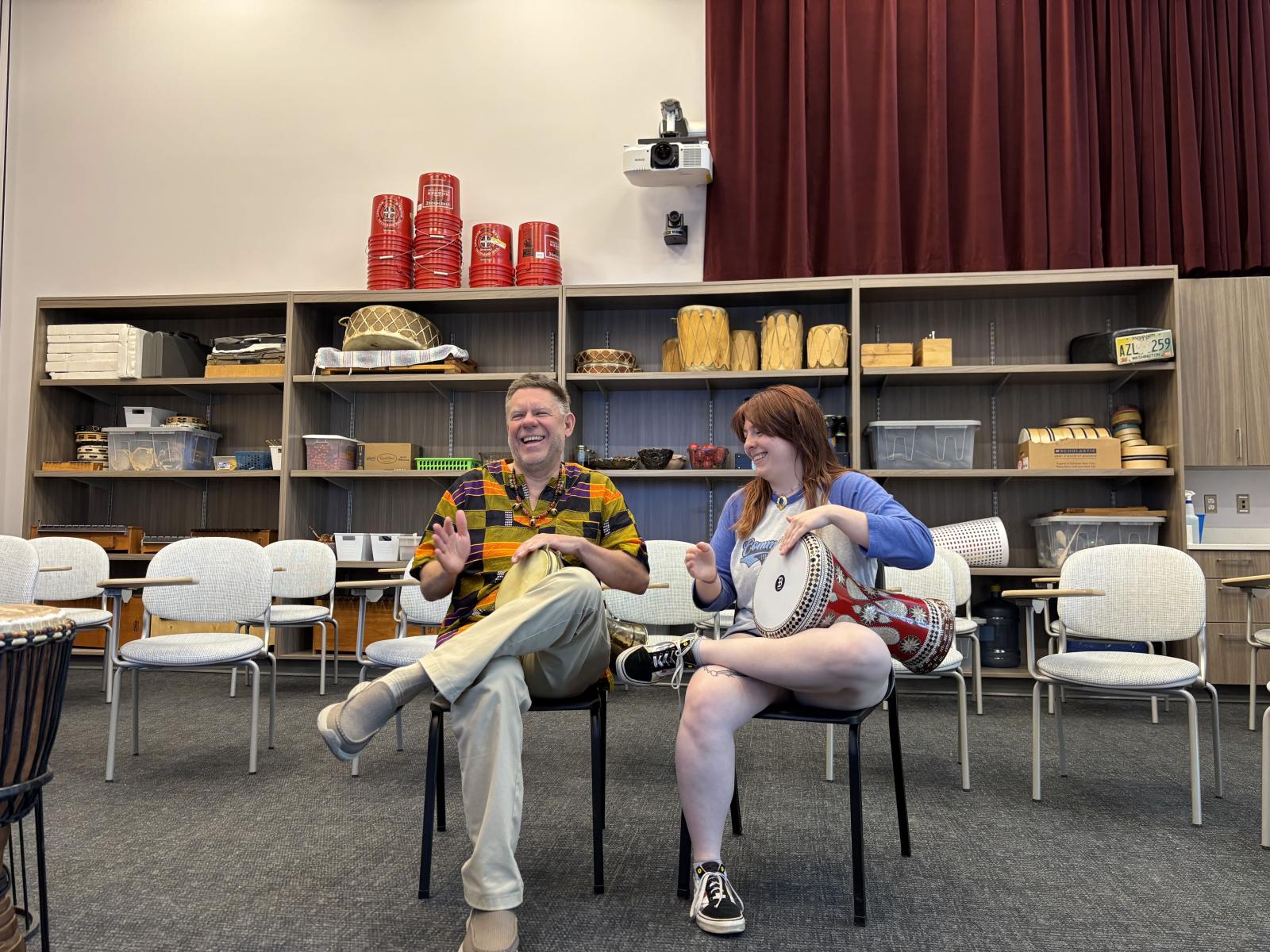Breaking New Ground: Natalie Staggers, First to Graduate with Music in Culture Minor

Natalie Staggers, a senior Communications major with a concentration in Print and Digital Journalism and a minor in Music in Culture, has been surrounded by music her entire life. In this interview article, Natalie reflects on how the Music in Culture minor has expanded her understanding of music’s global and cultural significance, sharing her experiences and thoughts on her unique academic journey.
What is your connection to music and how long have you been involved in the arts scene?
I have been involved in the arts scene pretty much since I was a tiny little kid. My dad has been in tons of bands ever since I was little and I can remember going to shows of his when I was 4/5 years old, standing out in the audience, so I’ve had a connection to music since I was young. Music has always been something that I am super passionate about. I started playing piano when I was 7 years old, picked up ukulele during COVID, and started playing bass last year. I’ve also been a singer basically ever since I could sing. Pretty much everyone in my family is involved in music somehow: my mom is a music and theater teacher and my dad has been in bands, like I said, since I was little. A bunch of my extended family, aunts and uncles, play in bands too. So music has always been a part of my life.
What inspired you to pursue this specific minor?
I knew that I wanted to do something with music, that’s why I went into communications in the first place actually. I knew that music was the one thing that I consistently had been passionate about my whole life, but I didn’t really want to major in music, so I decided to major in journalism and pursue being a music critic. That’s why I wanted to minor in something music related, but I didn’t necessarily want to be a performance music minor, so the Music in Culture minor just felt like the right fit.
How has studying global music traditions impacted your understanding of music as a global phenomenon?
I think a lot of people, whether or not they realize it, people who live in the US only have a really good understanding of western music, and I don’t think I realized how limited my perspective was before studying other music cultures. We’ve looked at African music, at Native American music, at all these different cultures, and it’s really interesting to see how people perceive and interact with music differently and how that impacts the culture of these different places around the world. I definitely think it has broadened my perspective of what music means to people, and helped me to have a better understanding of how music impacts people across the globe.
Can you share a favorite course or topic from the minor that really stood out to you?
Yeah, one of my favorite courses I’ve taken was the history of rock and roll and that’s because I’m a huge classic rock buff, that is my favorite type of music, and it was all online so I could do it at my own pace. That class was really fun because even though I love classic rock, it still broadened my perspectives because there were so many bands that I hadn’t looked into that I maybe knew the names of but didn’t know much about. I’ve also loved pretty much every class I’ve taken with Dr. Damm, he’s one of my favorite professors here at State. We’re doing an interactive drumming DIS right now and that’s been really fun because I’m getting to learn on djembe which is a really interesting instrument that I’ve always been interested in. I would say those are probably my two favorites.
What advice would you give to students considering this minor?
I would say if you’re looking for something to learn more, not just about music and how it works functionally, but about how it impacts people, this is definitely the minor to take. You get the music aspect, obviously, like I had to take History and Appreciation of music, which is about all these classic composers and it’s something you would expect when taking a music minor, but you also get a lot of the cultural background and history of people across the world. So you get a really wide range of education taking this minor. So if that’s something you’re interested in, or if you just want to broaden your perspective, then I think it’s a great idea to take this minor.
Is there a specific moment or experience from the program that you think captures what the minor is all about?
I remember my first class of world music with Dr. Damm, I walked in and was like five minutes early to class but everyone was already sitting in this massive circle around the classroom, and everybody had different instruments. There were rattles, drums, bells, and all sorts of stuff, and they were just having a big old drum circle. Dr. Damm was drumming and he didn’t even pause, he just motioned to me, “Come on, grab an instrument, hop in”. I think that’s a big part of what this minor is about, is really emphasizing how much community is a part of music. We think of community as a part of music in western culture, but it’s even more so that way in cultures across the world. Especially African culture, music is everything to them, it’s a part of everything that they do; it brings them together. I think that’s something that stood out to me was just walking into class and they were just already doing it. There was already music happening the moment that I walked in. I think that’s part of what Dr. Damm tries to emphasize a lot is that music is just a part of life and a part of everyday activity in a lot of cultures, and that’s how it felt when I walked into class.
Any final thoughts?
I would just say that it’s a great experience. It is a kind of new minor, so I know a lot of people don’t know about it, or might be unsure about taking it, but I saw it and it looked really interesting, it looked like something that would benefit me, and it definitely has. It exceeded my expectations, I have loved every class that I have taken for the minor. So if you’re interested in music and you’re interested in culture, and you want to broaden your perspective, it’s definitely the way to go.

